NAVIGATING PAID SEARCH & SOCIAL MARKETING FOR
INVESTMENT AND FINANCIAL SERVICES (OR ANY BUSINESS)
Introduction To PPC Marketing
Table of contents
What Is PPC Marketing
Pay-per-click (PPC) marketing is a powerful tool that investment and financial services businesses can use to increase their online visibility, connect with potential clients, and drive conversions.
At its core, PPC marketing is a form of online advertising where companies can pay to have their ads displayed to users who are actively searching for wealth management and financial services. When users click on an ad, they are directed to a landing page that offers more information about your company and its offerings, providing a valuable opportunity to engage with potential clients and build meaningful relationships.
In today's competitive online landscape, if you want to stand out from the crowd, capture the attention of your target audience and achieve further growth, PPC advertising is the perfect vehicle to do just that.
Here are 10 crucial benefits to using PPC as part of your business marketing strategy.

How It Works
Whether you're doing PPC for B2B or B2C, you will use a bidding system where businesses compete for ad placement by bidding on specific keywords or phrases. Search engines and Ad platforms then use criteria, such as bid amount, ad relevance, and landing page quality, to determine which ads to display and in what order.
When a user clicks on an ad, the company pays the search engine, social media ad platform, or advertising network a fee known as cost per click (CPC), which can vary depending on several factors, including the keyword's competitiveness, the quality of the ad, and other factors.
As an investment or financial service company if you want to run pay per click ads yourself, it's crucial to understand the PPC advertising process. A successful PPC campaign requires thorough keyword research, ad relevance, and high-quality landing pages to ensure effective ad placements and maximise conversions. Understanding the factors influencing the cost per click (CPC) is also critical in setting an appropriate budget for a PPC campaign.
By leveraging PPC advertising effectively, businesses can reach their target audience, drive traffic to their website, generate leads that translate into revenue, and stay within budget for a maximum return on investment (ROI).
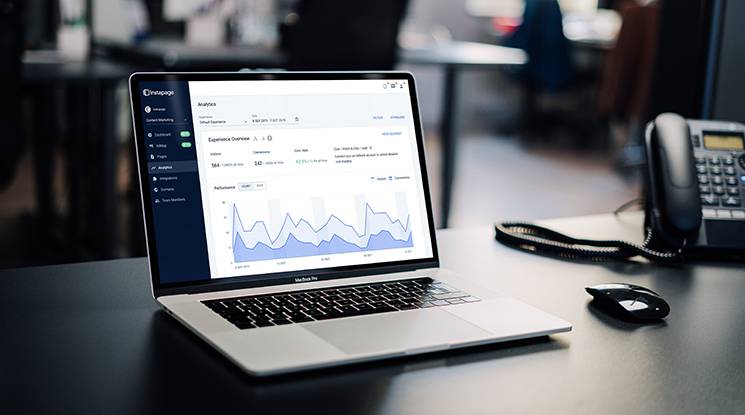
Types of PPC Campaigns
- Search Campaigns:
Search campaigns are the most common type of PPC campaign where businesses place ads on Google, Bing, and other search engine results pages. These ads appear when users search for keywords or phrases relevant to the business's products or services. Search campaigns typically involve text-based ads with a headline, description, and URL. Advertisers bid on keywords, and the search engine displays ads based on the bid amount and ad quality. - Display Campaigns:
Display campaigns involve placing ads on websites that are part of the search engine's display network. The display network includes a variety of websites that have partnered with the search engine to display ads. Display advertising campaigns can be text, image, or video-based. Advertisers can target specific websites or audiences based on demographics, interests, or behaviour. Display campaigns can be a good option for businesses wanting to increase brand awareness or reach a larger audience. - Social Media Campaigns:
Several major social media platforms including the likes of Facebook, Instagram, LinkedIn, and Twitter allow you to run ads that target specific audiences based on factors such as demographics, interests, and behaviour. Social media campaigns can be a good option for wealth management companies looking to reach high net worth clients and engage with them on social media. - Remarketing Campaigns:
Remarketing campaigns target users who have previously visited your investment, fintech or financial services website with ads tailored to their interests and behaviour. Remarketing campaigns have a broad reach with ads being seen across the web including search engines and on thousands of popular websites within large display networks. Remarketing ads are an especially good option for businesses who want to reach users that have already shown an interest in their products or services and just need a bit more exposure before they purchase. - Video Campaigns:
Video campaigns involve ads on video-sharing websites like YouTube. Video ads can be displayed before, during, or after a video and can be skipped after a few seconds. Video campaigns can be a good option for businesses that want to showcase their products or services more engagingly.
- App Campaigns:
App campaigns are used by businesses that want to promote mobile apps. App ads can be displayed on search engines or other websites on the display network. App campaigns can be a good option for businesses wanting to increase their app downloads or promote specific features. - Call-Only Campaigns:
Call-only campaigns are used by businesses that want to drive phone calls to their business. The ad only displays a phone number and a call-to-action in a call-only campaign. When users click on the ad, their phone automatically dials the business's phone number.
- Gmail Ads:
Gmail ads are used by businesses that want to reach users through their Gmail inbox. Gmail ads appear in the promotions tab of the user's inbox and can include text, images, or videos.

PPC Platforms
There are a plethora of different PPC Ad networks investment and financial service providers can use including search engines, social media advertising platforms, podcast networks, dedicated mobile networks and unique publisher ad networks. Each platform has its own strengths and weaknesses, and businesses should choose the platform that best fits their needs and goals.
Compliance in Financial Advertising
Regarding PPC advertising, compliance is essential for wealth management companies, fintech and financial service providers. Companies must follow several UK regulations and guidelines, including those set forth by the Financial Conduct Authority (FCA). These regulations are in place to ensure that businesses are not engaging in deceptive, fraudulent practices or misleading information in their advertising.
Companies should work with a PPC agency or consultant with experience in the investment and financial services industry and knowledge about the relevant regulations and guidelines to ensure compliance.
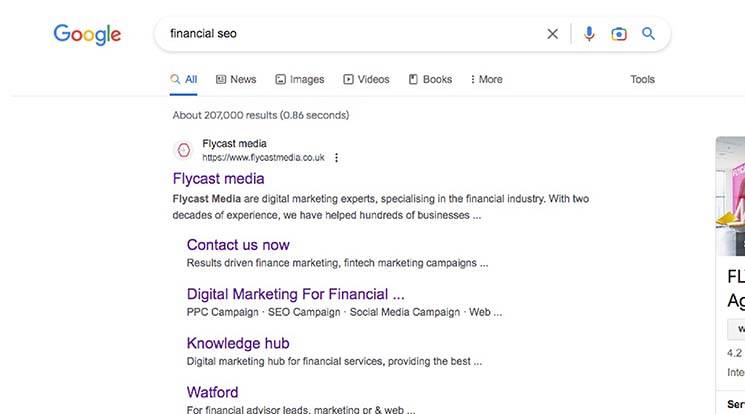
PPC Campaign Strategy and Planning
Setting Campaign Goals
A winning PPC campaign starts with defining clear and well-thought-out goals and objectives. The significance of setting SMART goals cannot be overstated. SMART goals are specific, measurable, achievable, relevant, and time-bound, making them an excellent starting point for any successful PPC campaign.
For instance, a business might set a goal to generate 50 new leads per month, increase website traffic by 25%, or achieve a specific conversion rate.
Setting specific goals is the cornerstone of a successful PPC campaign, as it provides the direction and focus necessary to develop effective campaigns. With SMART goals in place, businesses can measure the success of their campaigns against their objectives and adjust their strategy accordingly.
Moreover, setting clear objectives ensures that companies can make data-driven decisions that will benefit them in the long run.
Conducting Keyword Research
Keyword research is a crucial part of any PPC advertising campaign and should be undertaken to create a list of highly relevant keywords specific to the business and the investment and financial services you offer.
These will include high intent keyword phrases but also long-tail keywords which are less competitive and more targeted. A deep understanding of the target audience and their search habits is also vital to ensure that the chosen keywords align with their needs and interests.
To determine the most effective keywords to target, financial providers can use keyword research tools such as Google AdWords Keyword Planner, Ahrefs, and SemRush. These tools provide valuable insights into the search volume and competition for each keyword and can even suggest additional relevant keywords considerations.
By conducting thorough keyword research, your business can optimise its PPC campaigns for maximum return on investment, attract targeted traffic to your financial website, and ultimately drive conversions for more clients and sales.
Competitor PPC Intelligence
Competitor research is essential to any successful marketing strategy, especially in the world of PPC. By delving into the PPC tactics of your competitors, you can gain valuable insights into their strengths and weaknesses.
This information can help you fine-tune your own campaigns to achieve better results. A thorough competitor analysis involves examining various elements of your rivals' PPC campaigns, such as their ad copy, landing pages, keywords, and other factors.
One key benefit of competitor research is the ability to identify untapped opportunities in the market. By identifying gaps in your competitors' campaigns, you can create targeted PPC ads that resonate with your target audience.
Additionally, analysing successful competitors' strategies can help you identify and adopt best practices. By learning from your competitor's successes and mistakes, you can optimise your PPC campaigns and achieve greater returns on investment.
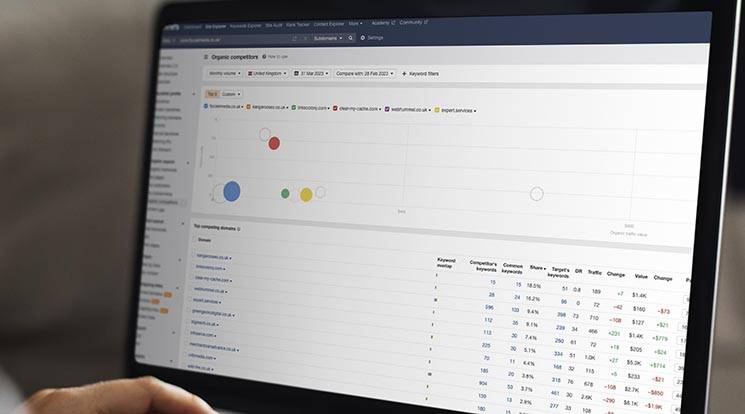
Understanding Your Target Audience
Understanding your target audience is vital to creating a successful PPC campaign. It is essential to take the time to conduct thorough research to gain insights into your audience's demographics, behaviour patterns, and interests.
Utilising tools like Google Analytics and social media analytics can help you track user behaviour and understand the channels that drive the most traffic to your website.
This information can help you know your audience and develop a PPC campaign that aligns with their needs. Once you clearly understand your target audience, you can tailor your ad copy, landing pages, and targeting strategies to speak directly to their needs and motivations.
Budgeting for PPC Campaigns
Like any marketing strategy, PPC campaigns require a budget. However, determining how much to spend on PPC can be challenging, as you need to balance your investment against the expected return.
There are several factors to consider when budgeting for PPC campaigns, including your business goals, the competitiveness of your industry, and the cost of keywords in your target market.
To ensure that your PPC budget is being allocated correctly, monitoring your campaigns' performance and making any necessary adjustments is essential.
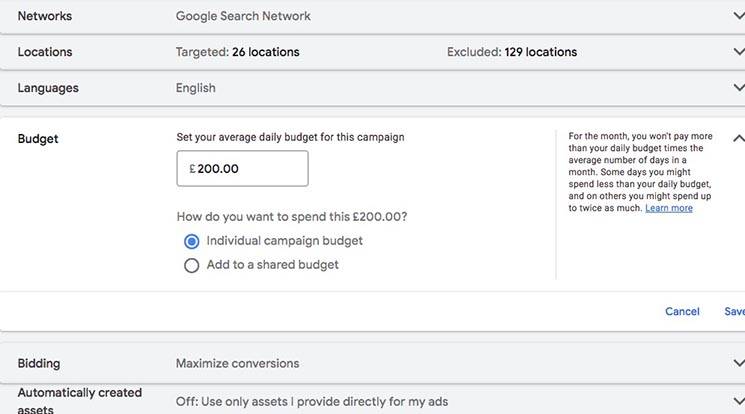
PPC Campaign Management
Setting Up PPC Campaigns
Once you have established your PPC strategy by defining your goals to determine precisely what you want to achieve and conducted thorough keyword research in line with the intent of your target audience, the next step involves setting up your PPC account and campaigns,
Whether you do it yourself or hire a ppc management agency, the process for setting up PPC campaigns on different platforms will vary but generally follow the same format, from choosing target audiences through demographics or keyword selection, creating ads, landing pages, scheduling etc.
Ad Targeting
Ad targeting allows you to define your target audience based on demographics, interests, and behaviours. Use ad targeting to ensure your ads are shown to the most relevant audience possible. Experiment with different targeting options to see which ones generate the best results.
Creating Ad Groups
Ad groups allow you to tightly group relevant keywords to a particular theme or product/service, making it easier to create targeted ad copy and landing pages.
This allows you to create specific ad copy that speaks to your target audience's needs and desires, increasing the relevance level. The same goes for creating landing pages which you can precisely tailor to the ad group's theme and messaging.
Creating Compelling Ads
Your ad copy should be compelling, relevant, and engaging. Use your target keywords in your ad copy and ensure that your messaging aligns with your business goals. Create multiple ad variations to test which ones perform the best. Experiment with headlines, ad copy, and calls to action to see which generate the most clicks and conversions.
Incorporating Ad Assets
Ad Assets (formally know as Ad Extensions) are a useful tool for enhancing your ads and providing extra information about your products or services. Here is a list of Ad Assets you can Incorporate into your ads:
- Sitelink Assets - Adds additional links to specific pages on your website.
- Callout Assets - Short bullet points highlighting key features or benefits.
- Structured Snippet Assets - Display additional information about products or services.
- Price Assets - Display prices for specific products or services.
- App Assets - Link to your mobile app from your ad.
- Promotion Assets - Display special offers or promotions.
- Lead Form Assets - Collect leads directly within your ad.
- Image Assets - Show images of your products or services.
- Call Assets - Allow users to call your business directly from your ad.
- Automated Assets - Automated extensions added by Google for an estimated ad performance boost
Automated Ad Assets do give you less control over what is and isn't shown specifically on your ads but does add extra options including seller ratings from third parties. You do however have the option to switch this feature on or off.
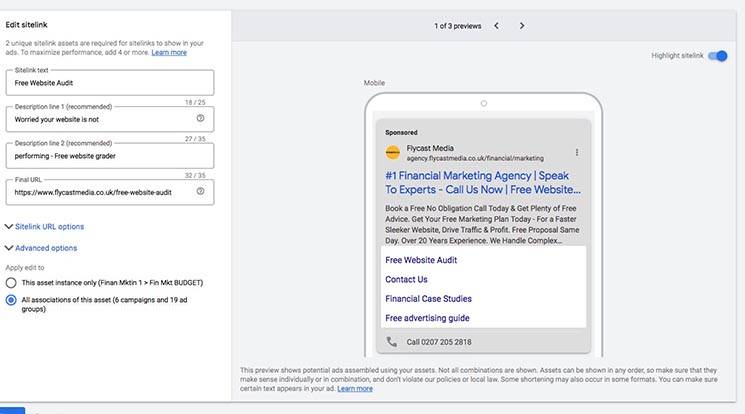
Creating Landing Pages
Create landing pages relevant to your ad copy and messaging. Optimise your landing pages for conversions, and ensure that they provide a seamless user experience. Ensure your landing pages have clear calls to action and are optimised for mobile devices.
Keyword Bidding
Keyword bidding strategies are crucial to the success of your PPC campaign. Use bidding strategies that align with your business goals and experiment with manual or automated bidding to see which ones generate the best results.
Bid on keywords with the highest intent for better conversions and monitor your bidding strategies accordingly so you can adjust them as necessary to maximise your return on investment.
Ad Placements
Ad placement is another important factor in the success of your PPC campaign. Experiment with different ad placements to see which ones generate the best results. Additionally, consider using ad assets to enhance your ad's visibility and functionality.
Ad Scheduling
Ad scheduling allows you to control when your ads are displayed. Use ad scheduling to target your audience at specific times of the day or week when they are most likely to search for your products or services.
Additionally, use ad scheduling to optimise your ad spend by avoiding times when your audience is less likely to search for your products or services.

PPC Tracking and Conversions
The Importance of Tracking in PPC Campaigns
Tracking is an essential aspect of any successful PPC campaign. It allows you to monitor the performance of your ads, gain insights into user behaviour, and make data-driven decisions to optimise your campaign for better results.
With proper tracking, you can save valuable resources on ads delivering the desired results.
Types of PPC Tracking
Several types of PPC tracking are available, each with its unique set of benefits and drawbacks. The main types are click, impression, and conversion tracking.
Click Tracking
Click tracking is the most basic form of tracking in PPC campaigns. It measures the number of clicks on your ads and provides valuable insights into user behaviour.
Impression Tracking
Impression tracking measures the number of times your ads are displayed to users.
While impression tracking provides less valuable data than click or conversion tracking, it can help you gauge the overall reach of your campaign and make informed decisions about your targeting strategy.
Conversion Tracking
Conversion tracking is a more advanced form of tracking that measures the number of conversions your ads generate. A conversion is an action that you want your website visitors to take, such as filling out a form, calling your business, or making a purchase.
By tracking conversions, you can gain insights into which ads drive the most valuable actions and optimise your campaign accordingly.

Types of Conversions
To effectively track your PPC campaigns, you need to identify the types of conversions that align with your business goals. There are two primary types of conversions:
Macro Conversions
Macro conversions are the primary actions you want your website visitors to take, such as purchasing or filling out a lead form. These conversions directly contribute to your business's bottom line.
Micro Conversions
Micro conversions are smaller, secondary actions that indicate user engagement with your website or brand, such as signing up for a newsletter or following your social media accounts.
While micro conversions may not directly generate revenue, they can help you build brand awareness and nurture leads into customers over time.
Identifying Goals and Creating Conversion Actions
Before you can track conversions in your PPC campaign, you need to identify your business goals and create conversion actions that align with those goals.
For example, if your goal is to generate leads for your business, you may want to create a conversion action for form submissions on your website.
Adding Conversion Tracking Code to Your Website
Once you've identified your conversion actions, you need to add a conversion tracking code to your website to track when those actions occur.
Most PPC advertising platforms, such as Google Ads and Facebook Ads, provide a conversion tracking code to add to your website's thank-you page or confirmation page. This code will track when a user completes a conversion action and attribute it to the corresponding ad in your campaign.
Testing and Verifying Conversion Tracking
It's vital that you test and verify the accuracy of your conversion tracking. This requires running test conversions and validating that they're precisely tracked and assigned to the appropriate ad in your campaign.
It's also equally important to consistently monitor your conversion data and use data-driven approaches to improve your campaign's performance for superior outcomes.

PPC Campaign Optimisation
Evaluating Your Campaigns
To measure the success of your financial services campaign you should perform a thorough ppc audit to change aspects which are having a negative effect and implement missed opportunities worth consideration.
Analysing key performance indicators (KPIs) is also an essential part of optimising a PPC campaign. Making data-driven decisions and identifying areas of underperformance can really help to improve campaign results.
Utilising your ad campaign dashboard and tools like Google Analytics provide valuable insights into campaign performance, including click-through rates, conversions rates, costs per conversion, quality scores, ad positions, bounce rates, traffic, conversion goals etc.
These metrics can indicate which ads and keywords drive the most conversions and which pages on a website are the most effective.
Adjustments can be made to optimise the campaign upon identifying areas that require improvement. This might include changes in targeting settings, keyword changes, revision of ad copy, or improving user experience on landing pages.
Continuously reviewing data and adjusting is necessary for PPC campaigns to remain effective. Vigilance and ongoing optimisation will ensure that your PPC campaigns perform at their best.
Outlined below are a few PPC optimisation tips you can implement to improve campaign performance.
Identifying Underperforming Keywords and Ads
Review your campaign data regularly to spot and remove underperforming keywords or ads. Look for keywords with low click-through rates (CTR), high cost-per-click (CPC), and advertisements with low conversion rates.
Leverage Google Analytics to assess your website's performance and determine which keywords and ads are driving the most traffic and conversions. This will allow you to enhance your campaign adjusting accordingly for the best results.
Negative keywords can play a huge role in eliminating irrelevant terms and will stop your ads showing up for poorly converting, low commercial intent search queries. Setup a regular schedule to check search term reports and add them to your negative keywords list.
A/B Testing
Every PPC campaign should have some form of A/B testing from the start as it helps you to identify which ads, ad groups, landing pages, and offers perform best over time.
While conducting A/B testing, it's a good idea to use statistical significance to determine the reliability of your test results. Statistical significance measures the probability that the observed difference between your test groups is not the result of chance.
Aiming for a 95% confidence level before making any changes to your campaign based on your test results is recommended. This ensures that the observed difference between your test groups is not just due to chance, enabling you to make data-driven decisions.
It's also worth noting that A/B testing is an ongoing process that requires regular attention. As your campaign evolves and your audience changes, what worked well in the past may be ineffective in the future. Therefore, you must regularly test to ensure that your campaign is running at optimal performance.
Ad Copy Optimisation
Ad copy is a vital element in every PPC campaign as it directly affects whether potential customers will click on your ad. How well they convert depends on how closely matched the ad is to your landing page and offer, so it's worth spending time getting it right.
The ad copy should clearly state the benefits of your product or service, including USPs like competitive pricing, quality, convenience, offers, or any other unique selling proposition.
Your ad copy should also use persuasive language that encourages customers to take action. This can include phrases such as "limited time offer," "don't miss out," or "exclusive deal." Using these types of words can create a sense of urgency and motivate customers to click on your ad.
Your ad copy should be specific and tailored to your target audience. This means using language that resonates with your audiences, such as industry jargon or specific product features. Doing so can build trust with potential customers and increase the likelihood of a conversion.
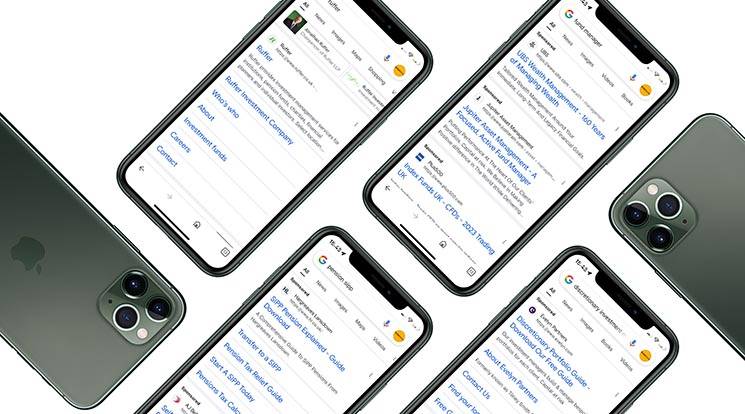
Landing Page Optimisation
Your landing page is a critical component in achieving PPC success. Here are a few recommendations to help improve your landing page for optimal results:
- Streamline your approach:
Focus your landing page on a specific objective and avoid superfluous distractions that may hinder your CTA. - Ensure mobile compatibility:
Guarantee that your landing page is optimised for all mobile devices and loads quickly. These enhancements can lead to significant gains in conversions. - Communicate clearly with your CTA:
Utilise bold lettering, contrasting colours, and compelling copy to make your call to action noticeable and compelling for visitors. - Make your value proposition clear:
Your landing page should clearly communicate the value of your product or service. Use headlines and subheadings to convey the benefits and unique features of what you're offering. - Use high-quality images:
The images you use on your landing page can significantly impact its effectiveness. Use high-quality images relevant to your product or service to communicate your message visually. - Build trust:
Trust is a critical component of any successful PPC campaign. Use social proof, such as customer testimonials or trust badges, to help build trust with your audience. - Optimise your form:
If you're using a form on your landing page, ensure it's optimised for conversions. Keep the form fields to a minimum and make them as easy to fill out as possible. - Test and optimise:
Continually test and optimise your landing page to improve its effectiveness. Try different variations of your headlines, images, CTAs, and forms to see what works best for your audience.
Here are a few additional tips you can use to reduce Google Ad spend with landing page optimisation.
Keyword Bid Adjustments
One crucial aspect in enhancing a PPC campaign is in modifying keyword bids to ensure that your ads are seen more prominently and are presented to the right audience at the appropriate moment. You can do this by proficiently altering keyword bids:
Bidding strategies enable you to mechanize your bidding process based on specific objectives. For instance, if you wish to increase clicks, you can make use of the Maximise Clicks bidding strategy.
Users may search for your product or service using different devices, and the price of clicks can differ depending on the device. You can modify your bids based on the device the user is searching on using device bid adjustments.
If your product or service relies on a specific location, then you can use location bid adjustments to modify your bids based on the user's location. This can help you refine your bids and make the most out of your budget.
If you observe that your ads perform better during certain times of the day, you can use time of day bid adjustments to adjust your bids accordingly.
Click Fraud Prevention
Click fraud in PPC advertising can cause significant damage to a company's marketing efforts and advertising budget. It is essential for businesses to understand the indications of click fraud and implement proactive measures to prevent it.
One way to prevent click fraud is by using click fraud detection and monitoring tools like Fraudlogix, ClickCease, and FraudScore.
These tools will look for any sudden spikes in click activity, multiple clicks from the same IP address or device, or clicks from geographically disparate locations Additionally, you can minimize the risk of click fraud by establishing click and conversion limits and targeting specific audiences.
Regularly monitoring your ad performance metrics such as click-through rates and conversion rates will help you to identify suspicious activity and take the necessary steps to prevent actions happening.
Click fraud can have a tremendous impact on your financial ad spend and overall marketing strategy so this is certainly an important issue you need to take into account when running ppc ad campaigns.

Opportunities For Growth
There are several ways to grow your ppc campaign, one of the most obvious being to increase the budget. By investing more money into ads that are performing well, you can increase the visibility of your ads and drive more conversions.
However, it's essential to ensure that any budget increase is done strategically and based on the data from previous campaigns.
Another opportunity for growth is in expanding the target audience. This can be done by adding new keywords or targeting recent geographic locations. For example, if your company only targets one city, consider expanding to nearby cities, counties, or even countries.
Additionally, incorporating new ad formats can provide growth opportunities. Google now offers shopping, display, and video ads, all of which can be used to connect with audiences in different ways. By experimenting with new ad formats, your business can expand its reach and find new ways to engage with potential customers.
Expanding to other ad networks is a very effective way to scale your campaigns. While Google Ads is the most popular and well-known PPC platform, numerous other networks can offer growth opportunities. For example, search networks like Bing Ads, major social networks like Facebook Ads, LinkedIn Ads, and Twitter Ads, and display ad networks like Taboola and Bidvertiser, and the list goes on.
Testing new landing pages is another option worth investigating. A company utilising a financial services website design will often have specific landing pages seen first by potential clients. So by trying different landing pages, this may garner improved conversions because the design, layout, copy, or offer is a better fit.
By taking advantage of these and other growth opportunities, your business can continually improve its PPC campaigns and drive more results.
In terms of growth in other areas of marketing, if you're interested in SEO, here's a comparison between using SEO vs PPC.

Shane McEvoy is a financial marketing expert with over 30 years' experience in digital advertising and financial services. He founded Flycast Media, a leading financial marketing agency, and has authored several influential guides and regularly contributes to respected industry publications - read his profile.